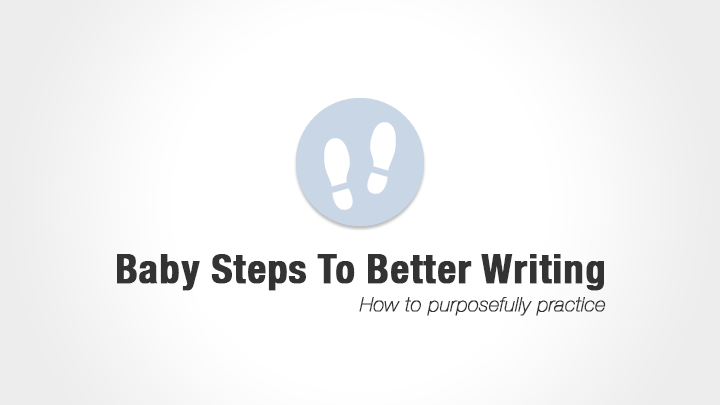How to purposefully practice
If you are a writer, you know that you need to write (every. single. day, if possible). If you don’t know that fact, I recommend starting with some much needed Jeff Goins treatment for your writing malady because Jeff is excellent at building the writer’s confidence. If you don’t write regularly due to Blank Page Syndrome, my post on Conquering the Blank Page might be helpful to you.
But if you are writing, if you are showing up at your desk (or your barista’s face followed by your favorite table), and you feel as though you just aren’t getting any better, or your improvement is too slow, I’d like to try and help you with that!
A Little Knowledge
When I first began writing my Storygram short stories, I felt what you feel. My fingers stretched over the keyboard from letter to letter like a pirate’s peg leg dragging over the deck of his sinking ship. After a few stories, I started wondering if I was getting worse. Maybe I wasn’t… Maybe it was all in my head… But my head was nevertheless repulsed by my writing, which was unhealthy.
Like all responsible proactive individuals, I took to Google and began researching writing techniques. Of course, I found about a billion “rules” to follow. I didn’t subscribe to any one rule with unwavering fortitude, but I did experiment… And here is where it gets freaking fun!
Baby Steps, Friends
When I tried to implement all of the things I was learning, it was just too overwhelming. All of these rules to keep in mind about how to construct flawless sentences… There were so many, and I just couldn’t handle it! Bleh!
Over the years I’ve become proficient in nearly every Adobe software program in the entire Creative Suite, as well as many other apps, such as Logic Pro X (which I wrote a blog post on here) and Davinci Resolve. If there’s one thing I’ve learned from beating my head against the desk trying to learn so many new apps, it’s that you have to wrap your mind around one tool at a time.
“NEVER use adverbs,” huh? Okay, fine. I’ll write a few Storygrams that are absent of adverbs. And that’s what I did.
“NEVER use adjectives,” huh? Sweet-tastic. I’ll write a few adjective-less Storygrams.
I took it one rule at a time and just practiced that one thing–I chose the verb for each sentence with a vocabularic X-Acto Knife that made dictionaries shudder–I chose the noun that needed no introduction. The list went on and so did the practicing, one rule at a time.
You might be thinking, “Aw, man, it takes TIME?! That’s the one thing I don’t have!” I feel ya, bro. But yes, it takes time. Writing is not a quick craft… Really, I can’t think of any craft that is truly “quick” to master… Nor can I think of any “masters” who would agree that they have mastered their craft!
However, I can assure you that the time will fly by as quickly as your childhood if you just dedicate your efforts to habitual and intentional improvement. Write intentionally, friends. Practice. You will get there.
Be sure to sign up for my newsletter because FREE stuff is coming down the pipeline, and you’re going to wish you had signed up before it gets here! And if this post helped you out, lemme know in the comments below (sorry for rhyming #SorryNotSorry)!
